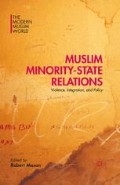Abstract
On May 18, 2009, the prolonged separatist conflict in Sri Lanka between the Liberation Tigers of Tamil Eelam (LTTE) and the Government of Sri Lanka (GOSL) came to an end with the death of the LTTE Leader Vellupillai Prabhakaran (VP),1 signaling the conclusion of one of the most turbulent periods of Sri Lanka’s history. The LTTE had been a powerful military force and a ruthless terrorist force, and had controlled territory running a civil administration in the North and East of Sri Lanka for many years. People directly and indirectly affected by the conflict number in their hundreds of thousands,2 while the conflict succeeded in polarizing different communities that make up Sri Lankan society.
Access this chapter
Tax calculation will be finalised at checkout
Purchases are for personal use only
Preview
Unable to display preview. Download preview PDF.
Bibliography
al-Ahsan, Abdullah, (1992), Ummah or Nation? Identity Crisis in Contemporary Muslim Society. Leicester: The Islamic Foundation.
Ali, A., (1984), “Islamic Revivalism in Harmony and Conflict: The Experience in Sri Lanka and Malaysia,” Asian Survey, 24(3), pp. 296–313.
Ali, Ameer, (1997), “The Muslim Factor in Sri Lankan Ethnic Crisis,” Journal of Muslim Minority Affairs, 17(2) (October), pp. 253–267.
Azeez, A. M. A., (1907), A Criticism of Mr. Mr. Ramanathan’s Ethnology of the Moors of Ceylon. Colombo: Colombo Moors’ Union.
Commonwealth Foundation, (2007), Engaging with Faith: Report of the Commonwealth Foundation Project on Improving Understanding and Cooperation between Different Faith Communities (2005–2007), Project Report, London: Commonwealth Foundation.
Deegalle, M., (2007), “Buddhist Monks and Political Activism in Sri Lanka,” in P. Broadhead and D. Keown, eds., Can Faiths Make Peace? Holy Wars and the Resolution of Religious Conflicts, London: I. B. Tauris and Co Ltd, pp. 134–148.
Guibernau, Montserrat. (2007), The Identity of Nations. Cambridge: Polity.
Gurr, T. R., and Harff Barbara, (1994), Ethnic Conflict in World Politics. Oxford: Westview Press.
Henne, P., T. Shah, and S. Hudgens, (2012), Religious Freedom and Violent Religious Extremism: A Sourcebook of Modern Cases and Analysis. Washington, DC: Georgetown University.
Imtiyaz, A. R. M., (2009), “Eastern Muslims of Sri Lanka: Special Problems and Solutions,” Journal of Asian and African Studies, 44(4) (August), pp. 404–427.
Imtiyaz, A. R. M. and B. Stavris, (2008), “Ethno-Political Conflict in Sri Lanka,” The Journal of Third World Studies, 25(2), Fall, pp. 135–152.
Imtiyaz, A. R. M., and S. R. H. Hoole, (2011), “Some Critical Notes on the Non-Tamil Identity of the Muslims of Sri Lanka, and on Tamil-Muslim Relations,” South Asia: Journal of South Asian Studies, 34(2), August, pp. 208–231.
Ismail, Q., (1997). “Unmooring Identity: The Antinomies of Elite Muslim Self Representation in Modern Sri Lanka.” in P. Jeganathan and Q. Ismail, Umnaking the Nation: The Politics of Identity and History in Modern Sri Lanka, Colombo: SSA. pp. 55–105.
McGilvray, D. B. and M. Raheem, (2007), Muslim Perspectives on the Sri Lankan Conflict, Policy Studies 41, Washington, DC: East-West Centre.
McGilvray, Dennis B., (2008), Crucible of Conflict: Tamil and Muslim Society on the East Coast of Sri Lanka. Durham, NC: Duke University Press.
McGilvray, Dennis B., (2011), “Sri Lankan Muslims: Between Ethno-Nationalism and the Global Ummah.” Nations and Nationalism, 17(1), pp. 45–64.
Nissan, E., and R. L. Stirrat, “The Generation of Communal Identities,” in J. Spencer (ed.), Sri Lanka: History and the Roots of Conflict, London: Routledge, 1990. pp. 19–44.
Puniyani, R., (2008), Contemporary India: Overcoming Sectarianism and Terrorism, Hope India, Delhi, India.
Ramanathan, P. (1888). “The Ethnology of the ‘Moors’ of Ceylon.” Journal of the Royal Asiatic Society, Ceylon Branch 10(36), pp. 234–62.
Ross, Russell R. and Andrea Matles Savada, (1988), Sri Lanka: A Country Study. Washington, DC: GPO for the Library of Congress.
Stone, J. (1995). “Race, Ethnicity and the Weberian Legacy.” American Behavioural Scientists 38(3), pp. 391–407.
Taras, R. and R Ganguly. (2002). Understanding Ethnic Conflict: The International Dimension. New York: Priscilla McGeehon.
Vythilingam, M, (1971), The Life of Sir Ponnambalam Ramanathan,Volume 1. Colombo: Ramanathan Commemoration Society.
Walters, J. S., (1995), “Multireligion on the Bus: Beyond ‘Influence’ and ‘Syncretism’ in the Study of Religious Meetings,” in P. Jeganathan and Q. Ismail (eds.), Unmaking the Nation: The Politics of Identity & History in Modern Sri Lanka, Colombo: Social Scientists’ Association, pp. 34–62.
Yakun, Fathi, (1990), To Be a Muslim. Plainfield, IN: American Trust Publications.
Editor information
Copyright information
© 2016 Amjad Saleem
About this chapter
Cite this chapter
Saleem, A. (2016). Muslim-State Relations in Sri Lanka: A Challenge for Post-Conflict Reconciliation. In: Mason, R. (eds) Muslim Minority-State Relations. The Modern Muslim World. Palgrave Macmillan, New York. https://doi.org/10.1007/978-1-137-52605-2_8
Download citation
DOI: https://doi.org/10.1007/978-1-137-52605-2_8
Publisher Name: Palgrave Macmillan, New York
Print ISBN: 978-1-137-53148-3
Online ISBN: 978-1-137-52605-2
eBook Packages: Political Science and International StudiesPolitical Science and International Studies (R0)

